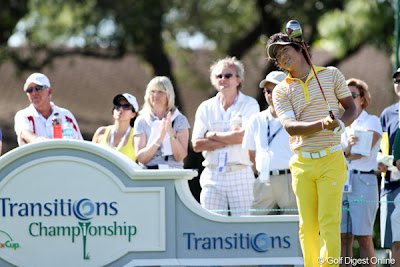Several days ago Ryo Ishikawa posted a message on his blog for the people of Japan. One of my Japanese friends, Noriko Imano, told me about it and supplied her translation.
Even though I'm in the US, I can feel that people in Japan keep calm and cooperate closely.
I'm very proud of this as a Japanese, from the bottom of my heart.
At the same time, I've been thinking what I can do as a professional golfer.
I'm far from Japan now, but I'd like to send words to encourage people in Japan who are fighting fears.
When you wish very strong, it surely comes true.
If everyone tries his best for what he/she has to do, good things will happen finally.
I really believe so.
This is the time when Japan and the world should be tied closely.
For Noriko... and for the other Japanese people I've spoken with... this message was both comforting and inspiring. It resonated with both young and old... in cities and in the countryside.
Over the past several days, the international press has collectively marveled at the Japanese sense of community and connectedness. Many have noted the absence of disorder, looting and lawlessness because in most of the rest of the world the reaction to disaster has looked quite different.
On September 11, 2001 I was working for the US branch of a French fine art publishing company. We had dozens of clients in downtown Manhattan, some just blocks from where the World Trade Center stood. I called each one of them in the dark days that followed the collapse of the twin towers and, one after another, they told me that their main concern in the wake of the of the attacks, was looting. Some resisted leaving their shops despite the chalky dust that that lined the streets and hung in the air and acrid smoke from the still-burning rubble. By the time I made my way down to see these clients several days later, the dusty streets had been cordoned off and the National Guard had been brought in to provide security. I passed through check points to get to the small galleries and shops and visit with the beleaguered shopkeepers. Ultimately, there were few reports of lawlessness the aftermath of 9/11... and many stories of courage and kindness... but the fear of looting was very real, and many of the natural disasters that occurred in the decade that followed 9/11... in widely disparate countries... produced reports of looting and price gauging.
Japanese culture, and the way the Japanese people are handling this monumental disaster... their civility, equanimity and respect for order... has become a huge part of the story these last days and the calm cooperation that Ryo referenced with pride in his message home, has captured the attention of the world.
Earlier today I received a message from Noriko that linked me to an article in Golf Digest Online, Japan. It featured the above photo from yesterday's Pro-Am at the Transitions Championship .
"Here is Ryo at Pro-Am in Ryo's color. According to the article of Golfdigest, during Pro-Am, Ryo's driver shots were not very good, so, he practiced driver at the practice range till 7pm. He was the last person who left the range."
Editor's Note: If you read this blog regularly, you probably know I've been Ryo fan for years. In fact I first wrote about him almost four years ago as he prepared to compete at Junior World and I've written him dozens of times since. It's been awesome to see him do so well. Ai Miyazato, Mika Miyazato, Makoto Takemura and Ryo's sister Yoko among them. I love Japanese golf fashion and accessories too and had been planning to get over there this summer. That may have to be put off for a bit but in the meantime I'm working on a couple of great ideas for supporting Japan and the Japanese people. I'll keep you posted.



I'm happy to see the world rallying around Japan. I hope to get there soon too.
ReplyDeleteThe Japanese don't have any immigrants and I think that makes a difference. Immigration brings many good things to any country but a the same time it most likely makes it more difficult for the population to feel the sense of oneness that the Japanese have.
ReplyDeleteAs we all know, golf is a mental game and it's got to be difficult to concentrate on golf when your country is struggling. I give the professional golfers of Japan a lot of credit for even being able to get out there.
ReplyDeleteI'm hearing all kinds of things about donations. Any thoughts on which organizations can be most effective on getting the aid where it's needed?
ReplyDeleteJapan is very much a capitalist country but the people care aobut their society. Americans are independent, individualists, the brand of capitalism here is more of an every man for himself. That's why there's looting at each opportunity.
ReplyDeleteThe difference between the way the Japanese people are reacting to this crisis and the way people in the US, Europe or elsewhere have reacted to past disasters is getting a lot of press. One thing that's certain is that the Japanese culture doesn't encourage individuals to seek the spotlight and be the center of attention as our culture does, and being humble is considered a quality there while it's more or less seen as a defect here. The entire mind-set is different and in a disaster situation where people may be called upon to help other people - without financial compensation - th Japanese culture definitely has the upper hand.
ReplyDelete